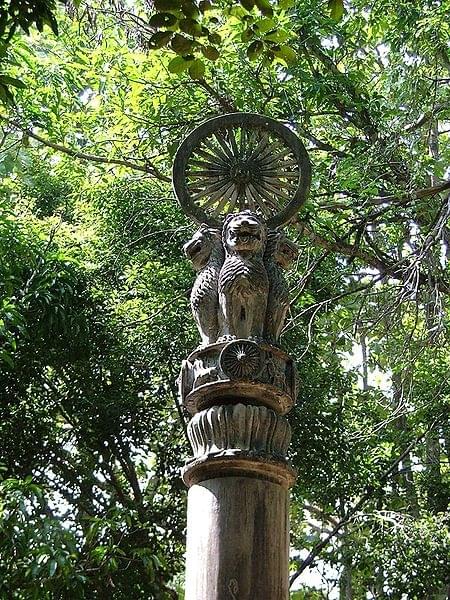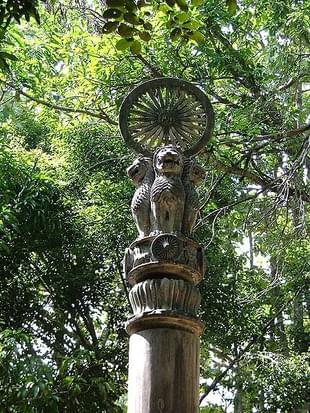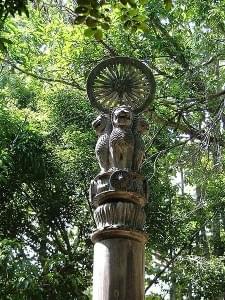Featured
Back to the basics
Chaitanya
Mar 02, 2011, 11:23 AM | Updated Apr 29, 2016, 03:09 PM IST
Save & read from anywhere!
Bookmark stories for easy access on any device or the Swarajya app.


This post is part of the CRI’s 1st year anniversary celebrations. We have launched a blogging festival where every member of the CRI Commentariat will participate and write on issues that affect their political outlook. Podcasts with Conservative intellectuals are also coming up, so stay tuned

The ideal end state of our politics must be a political and administrative system that is based in India’s social realities and harnesses our inherent strengths and manages our weaknesses so to enable us to reach our national goals.
India is undergoing rapid social change. In the context of this post, by social change we refer to the last 64 years of our existence as an an independent democratic republic. Specifically, the last twenty years, during which on account of the liberalization of our economy, the pace of change has increased dramatically, creating new certainties as well as giving rise to confusions. The certainties revolve mainly around India’s economic growth story, as economic reforms tend to take on a life of their own once unleashed. The confusions are many..
High rates of economic growth bring more and more Indians into the middle class while high growth also means there is more money to be looted by the corrupt. India clocks GDP growth rates of 8-9 % every year but human development indicators dont make as much progress; what has to be done so that ‘the fruits of economic growth reach the common man’? How will entrenched social hierarchies respond to these changes; will the backward classes use the more democratic environment in independent India to destroy these hierachies? Or will they take advantage of the opportunities thrown up by economic growth and move up the social ladder only to perpetuate those hierarchies? Is democracy a mill stone around India’s neck preventing rapid progress, especially in the context of authoritarian China’s spectacular progress, or will the slow and steady Indian democratic tortoise ultimately win the race and vindicate itself? Should we ditch the prevailing parliamentary form of government in favour of a presidential form of government, wherein the President is directly elected by the people, ensuring accountability and much needed strong leadership in line with growing aspirations and demands? The rapid change and the confusion that it has brought have forced us to an inflexion point where tough decisions are waiting to be made. In such times, it is necessary to go back to the basics to guide us through the fog of confusion.
Defining politics is a risky and troublesome exercise. It is hard to cut through the diverse political behaviour seen around the world and discover common principles of political behaviour. Further, based on such an inquiry, it is diffcult to define politics without inviting disagreement from people belonging to different persuasions. Hence, it is safer to stick to generic definitions such as this: politics is the set of activities that all societies undertake to create and maintain social order and cope with social disorder. By social order here we mean a state in which all activities in a society conform to certain broad norms of behaviour developed by every society, as a result of its unique cultural and historical experience as well as the physical setting.
While politics is a universal reality, the way it is practised presents sharp contrasts. After the collapse of the Soviet Union, democracy emerged as the world’s dominant political system. Francis Fukuyama was moved so much as to argue in The End of History and the Last Man that the end of the Cold War was not just that but “the end point of mankind’s ideological evolution and the universalization of Western liberal democracy as the final form of human government.” The Economist Intelligence Unit classifies about half the world’s countries as democracies and about half the world’s population as living under democracies. The Coloured Revolutions in former Soviet countries and fresh adoption of democracy by countries such as Bhutan are seen to be a part of a strengthening democratic trend in the world. Some would like to believe that the ongoing ‘revolutions’ in the Arab world point to a shift towards democracy in the Middle East, which is dominated by authoritarian regimes. Democracy, therefore, is very much the rage today. However, while most democracies are based on certain common principles such as popular elections, universal adult franchise, fundamental rights, an independent judiciary, separation or distribution of power and so on, there is vast diversity in the way democracy is practised and the results that it leads to.
For instance, why did the United States adopt a republican Presidential system, even though its colonizer Britain has the Prime Ministerial system with a hereditary head? Why does Canada allow special political arrangements for its indigenous people even though by virtue of being a democracy it is expected to treat all people as equal? Why did the authors of the Indian Constitution deem it fit to empower state governors to declare certain areas as Scheduled Areas and Tribal Areas, in violation of fundamental rights under Article 19 (theoretically speaking)? Why is banning turbans and banning public display of religious symbols such an issue in France, whereas the burkha is a common sight in India, another avowedly secular country? Why are India and Pakistan so different in their political culture even though they were both colonized by the same country and both resolved to become democracies after achieving their independence, at the same time? South Korea became an independent democracy in 1948, at about the same time as India did, but how come there is such a vast difference in economic advancement between the two? Simply, why is politics so remarkably different in countries, even those with common foundational principles? Because politics cannot escape social realities. The politics of every society is determined in a fundamental way by its culture, the common ways of behaviour, attitudes, ideologies, religion, language, traditions, customs, norms that are inherited by the members of a society, giving that society a unique personality and leading to unique responses to common challenges. To quote Pavan K. Varma, former diplomat and author of The Great Indian Middle Class, from a slightly different context:
Ideologies take root in the psyche of a people through the prism of their own tradition and hereditary way of life. The twentieth century spawned the myth of universal constructs, applicable to all people, irrespective of cultural and historical differences. The clarion call of Rousseau in the eighteenth century for the creation of an equal society was assumed to be powerful enough to overwhelm the tonal variations of people everywhere. Certain ideals were taken as given, and certain institutions considered sacrosanct. Colonized societies were particularly vulnerable to swallowing the idealized prescriptions given to them “for their own good” by their former rulers. But, as the last several decades have shown, the efficacy of the prescription was greatly dependent on the intrinsic metabolism of the patient. Broad-spectrum antibiotics may work in the field of medicine, but they do not work in societies, especially those with traditions of resistance and immunity going back centuries. [Being Indian, p.19]
Likewise, India’s politics and its responses to political challenges are determined by its social realities. India lacks neither the resources nor the labour and intellect to utilize these resources to lead to prosperity. India also has Western liberal democracy. Yet social divides and attitudes ensure that members of the society are unable to rise above narrow community and individual considerations for the larger good. To illustrate, let us consider the possibility of an Egypt style uprising in India, a matter that is being discussed with much excitement. The possibility is very remote for two reasons: 1. Participation by the middle class is necessary because it is they who posses the resources and the tools to organize a nation-wide movement; 2. The middle class are unlikely to participate due to their aversion for disorder and disruption.
The middle class has little reason to disrupt the current order of things, when it is delivering so many goods for them – creating opportunities, improving their incomes and making their lives more comfortable atleast in the material sense. In the prevailing circumstances, the middle class finds it too expensive – in terms of risks involved, expenditure of time and money, lost opportunities – to fight for a better deal. On the other hand, it is easier to take advantage of the ample opportunities thrown up by economic growth, improve income and with it their social and economic standing, and circumvent the problems posed by poor governance and corruption. Our attitudes influence our responses to many other problems. Corruption, for example, is viewed in very practical terms. The petty bribe is an investment to buy efficient service rather than a needless cost. For the Indian politician, the scam means several things: return on investment for money spent on elections, spending for upcoming elections, funding party activities, buying favourable media coverage and commentary, and so on. Indian voters seem to have resigned to the reality of political corruption. If the 2G scam provoked so much outrage, it was because of the magnitude of the scam, not the fact that it is basically a theft of public money, something that has come to be accepted as a normal feature of Indian politics. The social divides come to the fore in electoral behaviour. Indian voters are a diverse entity: there are middle class voters, BC voters, SC voters, Christian voters, Muslim voters, and so on. But for all of them, the election is an exercise to put ‘their man’ or ‘their party’ in power so that their narrow community interests are protected, atleast according to promises made before the election.
On the other hand, Indians draw from a vast pool of strengths that are also a result of their culture and historical experience. The thrift, ingenuity and hardwork of the billionaire industrialist to the dabbawallah are as much responsible for India’s economic growth story as the liberalized economic environment. If India was able to grow in the stifling economic environment during much of the last 64 years, it was inspite of the government, not because of it. If the ability to adapt to and work around the most stifling constraints allows us to thrive in India, the absence of such constraints brings out the best out of the Indian genius, as evidenced by the fact that Indians are a hugely successful ethnic community in Western countries where the environment is more favourable for economic pursuits. Also by the fact that the liberalization of the economy at home itself has sparked tremendous progress in the last twenty years.
The majority religion, Hinduism, also influences the Indian mindset in important ways. Hinduism does not vilify profit making. Artha (material wellbeing) and Kama (pleasure) are two of the four goals of life (Purusharthas) that must be pursued, within the confines of Dharma (order and righteousness), to lead to Moksha (self realization), dharma and moksha being the other two goals. Hinduism does not demand unthinking obedience to preset rules and preconceived notions. It allows every individual to chalk out one’s own path in life within the broad limits set by dharma. The Indian mind loathes black and white descriptions and tends to recognize truth in its various shades. Some may find it odd that ISRO scientists – even Christians – offer prayers at Tirupati before or after major satellite launches but the distinction between the sacred and the secular is largely meaningless and unnecessary to the Indian mind. One of India’s foundational strengths is the family. The average Indian family is a wonderfully self sufficient socioeconomic unit. It combines the functions of a school (for transmitting age old values and norms to the young), a social security apparatus (in times of crisis), an investment bank (for new business ventures), a career counsellor (for advice), and so on.
India’s strengths and weaknesses, therefore, are rooted in its culture and social realities. The ideal end state of our politics then must be a political and administrative system that is based in India’s social realities and harnesses its inherent strengths and manages its weaknesses so to enable us to reach our national goals. Towards this end, it is necessary to first reexamine commonly held beliefs about institutions, systems and ideologies, and expectations arising from these beliefs to lead us to desired results. To suggest a few examples, we think we can check corruption provided we have new laws and policies and strictly implement them, even though the prevailing political and administrative system incentivizes corruption by its very nature and the very manner of its operation. We expect communal riots not to happen merely because we are a secular state, even though the way secularism is practised in India is often a part of the problem, not the solution. We expect our social hierarchies to crumble and lead to an equal society just because we have democracy, even though democracy has become just another means for social mobility and perpetuating hierarchies. We expect our ‘aam aadmi’ policies to lead to a better deal, even though these policies make the aam aadmi dependent on the state, and reward sloth and punish innovation and ingenuity. We expect the ‘fruits of economic growth’ to ‘trickle down’ even though the trickle has not happened at a pace we would have liked, and poverty remains a fundamental issue. There is a vast gulf between our expectations and the results.
It is necessary therefore to cut down the heavy web of myths and beliefs that dominates our political discourse, prevents the ferment of fresh ideas and holds back our polity from evolving to match the demands of a rapidly changing India. The prevailing narrative must change to demand a system that more accurately captures our social realities and is more in tune with our aspirations. Anything else is a compromise, and amounts to making peace with the vast gulf between expectations and results, delaying India’s political moksha. The fresh reexamination that we seek will not come from the Left, Liberal and Centrist sections of our political discourse. Simply because it is they who construct as well as benefit from the prevailing narrative and hence have no incentive to alter it. The philosophy and the ideas underpinning this reexamination will and must come from the Right.





